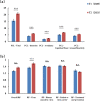The increase of PTSD in front-line health care workers during the COVID-19 pandemic and the mediating role of risk perception: a one-year follow-up study
- PMID: 35504870
- PMCID: PMC9062850
- DOI: 10.1038/s41398-022-01953-7
The increase of PTSD in front-line health care workers during the COVID-19 pandemic and the mediating role of risk perception: a one-year follow-up study
Abstract
The long-term health consequences of the COVID-19 pandemic on health care workers (HCWs) are largely unclear. The purpose of the present study was to investigate the development of posttraumatic stress disorder (PTSD) in HCWs in a longitudinal manner. Additionally, we further explored the role of risk perception in the evolution of PTSD over time based on a one-year follow-up study. HCWs were recruited from hospitals in Guangdong, China. Demographic information, the PTSD checklist for DSM-5 (PCL-5) and the risk perception questionnaire were obtained online at two different time points: May to June 2020 (T1), with 317 eligible responses, and June 2021 (T2), with 403 eligible responses. Seventy-four HCWs participated in the survey at both T1 and T2. The results revealed that (1) the PTSD prevalence rate in the HCWs (cut-off = 33) increased from 10.73% at T1 to 20.84% at T2, and the HCWs reported significantly higher PTSD scores at T2 than at T1 (p < 0.001); (2) risk perception was positively correlated with PTSD (p < 0.001); and (3) PTSD at T1 could significantly positively predict PTSD at T2 (β = 2.812, p < 0.01), and this longitudinal effect of PTSD at T1 on PTSD at T2 was mediated by risk perception at T2 (coefficient = 0.154, 95% CI = 0.023 to 0.297). Our data provide a snapshot of the worsening of HCWs' PTSD along with the repeated pandemic outbreaks and highlight the important role of risk perception in the development of PTSD symptoms in HCWs over time.
© 2022. The Author(s).
Conflict of interest statement
The authors declare no competing interests.
Figures



References
-
- WHO. Director-General’s opening remarks at the media briefing on COVID-19 – 7 June 2021. WHO Director General Speech. https://www.who.int/director-general/speeches/detail/director-general-s-.... 2020.
Publication types
MeSH terms
LinkOut - more resources
Full Text Sources
Medical

